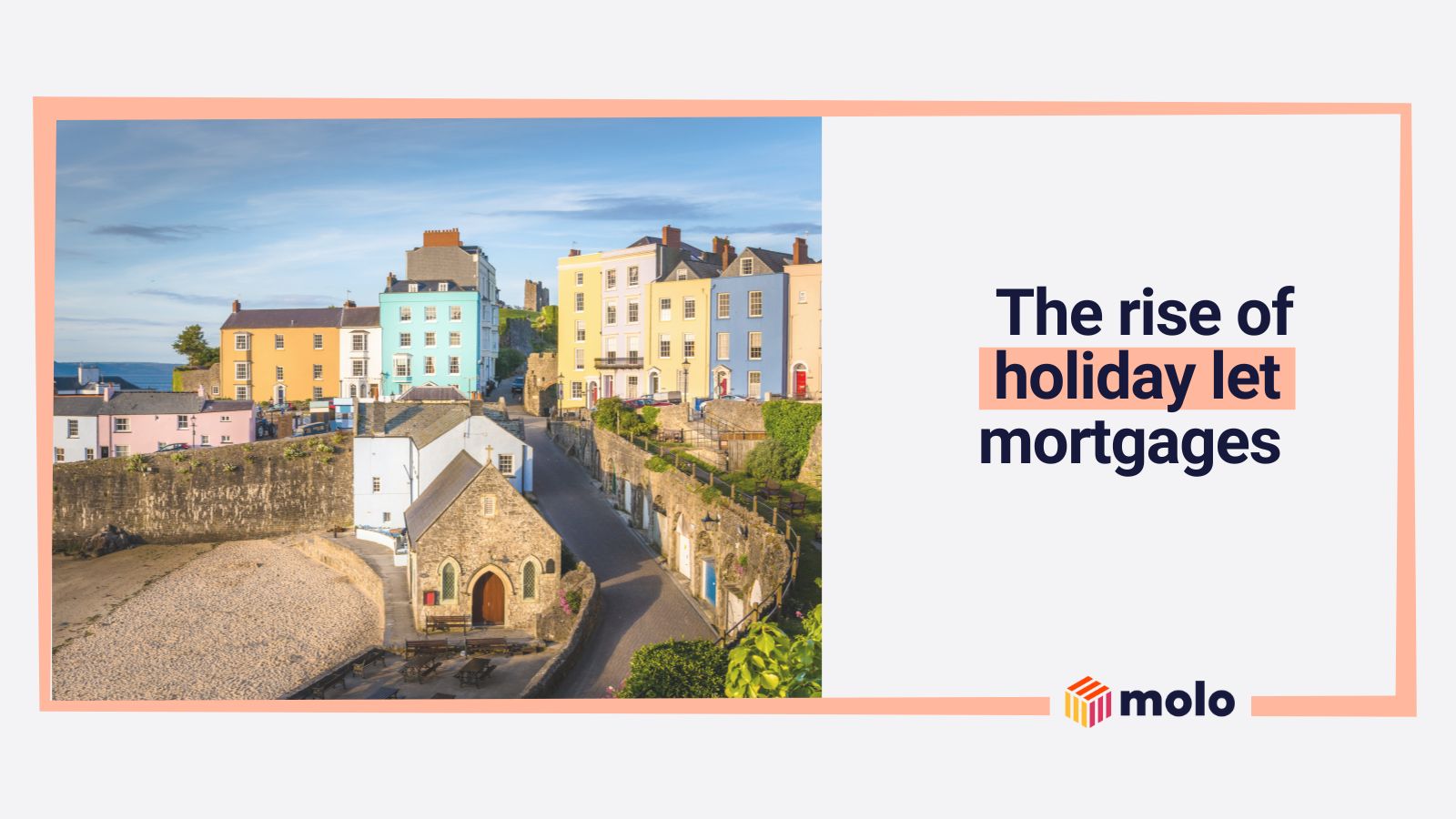The rise of Airbnb and other hospitality marketplaces has led to an increase in holiday lets. In the last three years, the number of holiday lets across the UK has shot up by 40%. It shouldn’t come as a surprise, then, to learn that holiday let mortgages are becoming increasingly common with people who want to let out properties in the short term. In this guide, we take a deep dive into the world of holiday let mortgages with everything you need to know, from finding the right deal to applying.
What is a holiday let?
A holiday let is a property rented out for short-term stays, typically ranging from a few days to a few weeks. Unlike traditional long-term rentals or buy-to-let properties, holiday lets are fully furnished, providing guests with all the amenities and comforts they would expect in their own homes. This can include everything from furniture and appliances to linens and kitchenware.
Holiday lets are often located in popular tourist areas or near sites of interest, making them an attractive option for travellers seeking a more personal and homely experience than what a hotel might offer. From cottages in the Cotswolds to modern apartments in the heart of Manchester, holiday lets cater to a wide range of tastes and preferences.
In recent years, there’s been a surge in holiday lets across the UK, from seaside towns to city centre locations. This trend reflects the evolving preferences of travellers who value the convenience and flexibility that holiday lets offer. These properties provide a unique opportunity for guests to immerse themselves in the local culture and lifestyle, whether it’s in a bustling city or a serene countryside.
Moreover, holiday lets are not just limited to holidaymakers. They also cater to corporate travellers and people seeking temporary accommodation, further broadening their appeal.
In essence, a holiday let offers a home away from home for travellers. It combines the comfort and privacy of a home with the novelty and excitement of travel, making it a popular choice for those seeking unique and personalised accommodation experiences.
What is a holiday let mortgage?
Those who specialise in renting out holiday lets offer guests the chance to stay in their property all year round. For many holiday let owners, the best way to purchase this type of property is with a holiday let mortgage.
Holiday let mortgages are a specific type of loan product designed for properties that will be rented out on a short-term basis, typically as holiday rentals. These mortgages are a unique financial product in the lending market, tailored to meet the needs of property owners in the holiday let sector.
Unlike standard residential mortgages, which are typically for properties the owner intends to live in, or buy-to-let mortgages, which are designed for properties that will be rented out to long-term tenants, holiday let mortgages take into account the unique aspects of running a holiday rental business. This includes the fluctuating income that can come from renting a property on a short-term basis, as well as the potential for periods of vacancy.
When assessing an application for a holiday let mortgage, lenders will consider the potential rental income from the property. This is often based on projected occupancy rates and rental charges, which can vary depending on the location, size and quality of the property, as well as the season.
It’s also worth noting that holiday let mortgages often require a larger deposit than standard residential mortgages, reflecting the higher level of risk associated with this type of lending. However, for many property owners, the potential returns from operating a successful holiday let can make this a worthwhile investment.
What’s the difference between a holiday let and buy-to-let?
Buy-to-let properties are typically rented out for extended periods, making them a popular choice for property investors. Holiday lets, however, are now emerging as an appealing alternative. They can often command higher rental rates due to their appeal to holidaymakers, and they also come with distinct tax advantages.
For instance, as a holiday let owner, you’re allowed to offset the entire amount of mortgage interest against the rental income when calculating your profits. This is a benefit that buy-to-let investors no longer enjoy. Instead, they receive a tax-credit, which is based on 20% of their mortgage interest payments.
It’s worth noting that any property needs to meet specific criteria set out by the HMRC in order to qualify as a holiday let for tax purposes.
This includes:
- Being available for let as furnished holiday accommodation for at least 210 days per year and actually rented out for at least 105 days a year.
- Any continuous stay of more than 31 days won’t count towards the 105 days a year, unless it meets certain conditions.
- If your property does qualify as a furnished holiday let, you can claim capital gains tax relief for traders when you sell, according to HMRC.
For more information, see the Governmetn’s official holiday let guidance.

How much you can borrow
Molo offers a range of Holiday Let mortgage deals starting from 75% LTV
Do I need to get a specialist holiday let mortgage?
Yes, if you’re planning to purchase a holiday home and require financing, you’ll need to consider a specialist holiday let mortgage. Traditional residential mortgages typically have terms that prohibit letting out your home, and a buy-to-let mortgage may not be the right fit for your needs.
The challenge with a buy-to-let mortgage lies in the way lenders calculate your affordability. They determine an annual rental income based on the premise that the property will be let on an assured shorthold tenancy of six to 12 months. This calculation method often means that anyone seeking a mortgage for a holiday let may not meet the lending criteria for a buy-to-let mortgage.
The income from a holiday let isn’t quite as predictable as that from a long-term rental. During peak holiday seasons, holiday let income could significantly exceed that of a buy-to-let property, but it’s not guaranteed throughout the year due to quieter periods when the property may be vacant.
Therefore, when considering a holiday let mortgage, lenders often base their loan amount on a projected income figure. This projection takes into account the fluctuating nature of holiday let income, rather than simply being a multiple of potential rental income. Taking this approach allows lenders to offer a more tailored and realistic mortgage product for those looking to invest in the holiday let market.
In essence, a holiday let mortgage is a specialised product designed to cater to the unique financial dynamics of holiday rentals. Understanding these differences when considering your financing options for a holiday home will help you find the right mortgage option for your holiday let.
What is the lending criteria for a holiday let mortgage?
Lending criteria varies between mortgage providers, as they may have different levels of requirements. At Molo, we offer holiday let mortgages, and our criteria consists of the following:
- Up to 75% Loan to Value (LTV). We currently lend up to 75% LTV for Holiday-let properties
- Physical valuation. A physical valuation is required to decide the suitability of the property
- Experienced landlords. Landlords must have 12 months’ experience renting out a property
See the full holiday let eligibility of our mortgages
How much can I borrow for a holiday let mortgage?
When considering how much you can borrow for a holiday let mortgage, lenders will take into account several factors. These include not only your deposit and the projected rental income from the property but also your personal income and expenditure.
For instance, if you already have a substantial mortgage on your primary residence, this could significantly influence the amount you can borrow for a holiday let. Lenders need to ensure that you can comfortably meet the repayments on their mortgage, even during periods when the holiday property might not be let.
The nature of the property you intend to purchase also plays a role in your ability to secure a holiday let mortgage. Lenders need to be confident that the property could be easily sold if necessary. Therefore, they might be hesitant to provide a mortgage for properties in holiday parks or those that are restricted to use solely as holiday homes.
In essence, the amount you can borrow for a holiday let mortgage is determined by a combination of factors related to both the potential income from the property and your personal financial circumstances. Understanding these factors can help you assess your borrowing capacity and make informed decisions about your holiday let investment.
To illustrate a holiday let mortgage, let’s say you’re interested in purchasing a property valued at £300,000.
You would need to provide a deposit of at least £90,000. Furthermore, the property would need to generate a minimum annual rental income of £13,500, based on a mortgage interest rate of 5%.
Finding the best holiday let mortgage ultimately depends on several factors, including the interest rate and the general terms of the mortgage. Holiday let mortgages aren’t as common as other mortgage products, so it might be worth talking to a broker who can advise you on the best lenders for holiday let mortgages. Alternatively, you can use Molo to get your holiday let mortgage.
Just remember that securing a good mortgage rate is only one piece of the puzzle. The property’s location can greatly affect the rental income you can expect, which in turn impacts your mortgage affordability.. Therefore, it’s important to choose the right property in the right location.
To make an informed decision, conduct thorough research and consult with local letting agents to understand the demand in the area. This will help you create a realistic rental income projection, which lenders will use when assessing your mortgage affordability. By combining a favourable mortgage rate with a well-chosen property, you can maximise your returns from your holiday let investment.
Investing in a holiday let can be a lucrative venture if managed correctly, but it’s not without its challenges. For instance, you’ll need to ensure you can meet the monthly mortgage payments, regardless of whether the property is let out.
Additionally, you’ll need to decide whether to manage the property yourself or hire a professional to do so. Moreover, you must be prepared to cover the costs of any significant repairs and ongoing maintenance that the property may require. It’s highly recommended to seek professional financial advice before venturing into the holiday let market.
Getting a holiday let property abroad come with its own complexities. For this reason, it’s important to seek expert guidance throughout the purchase process, including how to secure a mortgage.
You might find that a UK bank with operations in the country where you plan to buy is the most suitable option. But more likely, a local lender in the intended country who knows the market might be a better fit.
The term holiday let is quite broad. For example, most people associate holiday lets with Airbnb, but some lenders don’t even allow you to list your holiday let on the platform (we allow Airbnb lets at Molo). Additionally, some holiday let owners don’t explicitly advertise their properties for holidays and instead offer them for short-term lets.
A short-term let can be anywhere between a few weeks and a few months – it’s generally considered any let under six months long. Ultimately, how you advertise a holiday let depends on your goals, but it’s worth understanding the difference between a holiday and short-term let compared to a traditional long-term let that usually lasts 12 months or longer.
Final thoughts: we’re all going on holiday
Buying and renting out a holiday let can be a profitable business venture that acts as a replacement to traditional buy-to-let or runs alongside it. The main thing is to have options for how you let your property, and having a holiday let means you’re potentially growing the number of property owners who let their investment out in the short term.
Check your full mortgage eligibility before applying for a holiday let mortgages with us.

How much you can borrow
Molo offers a range of Holiday Let mortgage deals starting from 75% LTV


